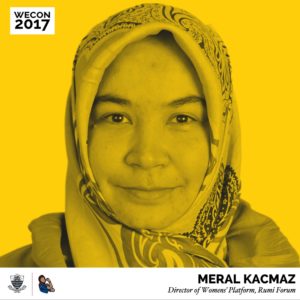Abdullah Bozkurt/Stockholm
Turkey’s National Intelligence Organization (Milli İstihbarat Teşkilatı, or MİT) secretly asked the government to make up an arrest warrant in order to spirit away an innocent Turkish woman in Pakistan as part of the illegal rendition of her entire family.
According to a classified MIT document that was submitted to select cabinet members and the chief public prosecutor in Ankara on October 13, 2017, the notorious intelligence service urged the government and prosecutor to create an arrest warrant for Meral Kaçmaz, the director of the Women’s Platform, a Rumi Forum project.
Kaçmaz, a biology teacher by profession, was not facing any criminal investigation in Turkey at the time, and no warrant had been issued for her, but her husband, Mesut Kaçmaz, the former director of the PakTurk schools, was in the crosshairs of the government of President Recep Tayyip Erdoğan. It was clear that the couple, who had two daughters, had been under surveillance by MIT agents on Pakistani soil at the time and that the intelligence service was planning to kidnap them with the help of the Pakistani security services.
Living in Pakistan for years, Meral Kaçmaz advocated gender equality and women’s empowerment, was featured as a speaker at many events and was critical of the authoritarian Erdoğan regime. She was also affiliated with the Gülen movement, a group that is highly critical of the Erdoğan government on a range of issues from pervasive corruption in the administration to Turkey’s aiding and abetting of armed jihadist groups.
It appears the Turkish government decided to bring her back to Turkey in order to silence her and stop her advocacy campaign, but there was no arrest warrant in the judicial system that would convince Pakistani authorities to cooperate in her rendition. As a result, MIT wrote to the government in a secret letter detailing her activities for the Rumi Forum and making clear that an arrest warrant needed to be created for her return.
Secret Turkish MIT document plotting to frame a female activist in order to bring back her to Turkey (Turkish ID numbers were redacted by Nordic Monitor):
The secret document exposes how judicial investigations and court cases were decided by the intelligence service as opposed to an independent judiciary. MIT has no authority to steer judicial probes and certainly no mandate to ask the government to issue an arrest warrant under the penal system and the Code on Criminal Procedure (CMUK).
The letter was submitted to then-Deputy Prime Minister Bekir Bozdağ, Interior Minister Suleyman Soylu and Ankara Chief Public Prosecutor Yüksel Kocaman. It was also circulated to the Foreign Ministry, Justice Ministry and police department.
When MIT sent the secret letter to the upper echelons of the government, Mrs. Kaçmaz was still in the hands of the Pakistani authorities. Kaçmaz, her husband and two daughters were kept in a secret location near Fortress Stadium in Lahore, close to a military base, after plainclothes police officers from Pakistan’s Counterterrorism Department (CTD) raided their home in Lahore on September 27, 2017. This means when Mrs. Kaçmaz was abducted, there was no warrant out for her. In other words, the Pakistani police and MIT violated the laws in their respective countries when they illegally kept her in detention.

Mrs. Kaçmaz and her family were put on a Turkish plane on October 14, 2017, a day after MIT asked the government and prosecutor’s office to create a warrant for her. Although the family was under the protection of UN Refugee Agency (UNHCR) with an asylum seeker certificate and a ruling by the Lahore High Court (LHC) that barred the government from deporting them pending legal proceedings, the Kaçmaz family was unlawfully turned over to Turkish intelligence officials.
The beatings and abuse started on board the plane, with Mesut battered by Turkish officers in front of his wife and two daughters. After landing in Istanbul, he and his wife were separated, detained, arrested and subjected to further torture and ill-treatment in detention and prison. They were threatened with the murder of their daughters unless they sign prepared statements that would incriminate them.
It was clear that Pakistani authorities aided and abetted the rendition of the Kaçmaz family. Nordic Monitor previously published a secret memo that revealed the government of Pakistan had illegally passed confidential information to Turkey about Turks who had sought protection status with UNHCR in Islamabad in a flagrant violation of United Nations rules.
Erdoğan, incriminated in a major corruption scandal in 2013 that exposed secret kickbacks in money laundering schemes involving Iranian sanctions buster Reza Zarrab, blamed US-based Turkish Muslim cleric Fethullah Gülen for the graft investigations into his family members and business and political associates. He brandednthe Gülen movement as a terrorist entity although no violent action has been associated with it, and launched a major crackdown on the group, jailing and/or purging tens of thousands of government employees, unlawfully seizing their assets, shutting down schools, universities, NGOs, media outlets, hospitals and other entities that were owned or operated by people associated with the movement.

In 2016 Erdoğan added the coup charges against Gülen, who denied any involvement in the abortive putsch that was branded by many as a false flag operation organized by President Erdoğan and his intelligence and military chiefs. Erdoğan used the event as a pretext to transform NATO’s second largest army into a hotbed of neo-nationalists and Islamists with a purge of almost 80 percent of all generals and admirals. He also acquired “imperial” presidential powers and launched cross-border offensives into Syria.
According to official data announced in February 2021, a total of 622,646 people have faced punitive legal action in the last five years by the government due to alleged links to the Gülen movement. Of these, 301,932 people have been detained and 25,467 jailed pending trial or due to conviction. Nearly 100,000 people were released after imprisonment under judicial supervision, meaning they are subject to a travel ban and are required to check in with the local police station on a regular basis.












